[Click on BLUE links for sources and more information]
I woke up. In the darkness I sensed a presence. I rolled out of bed reluctantly. I went to pee. I made coffee. While drinking my coffee I realized the presence was always with me. A memory.
There are lots of elephant napkins in the Sea Gull collection. I wonder why. They say elephants never forget. For an elephant, a memory lasts forever. Now, that’s something.
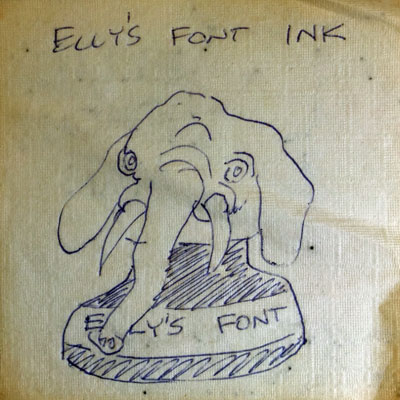
Sea Gull Cellar Bar Napkin Art, artist unknown
I finished my coffee. They grew the beans in a little town up in the hills outside Puerto Vallarta, San Sebastian del Oeste. A dim morning light quietly replaced the darkness. That’s when I realized the memory, whatever it was, was gone.
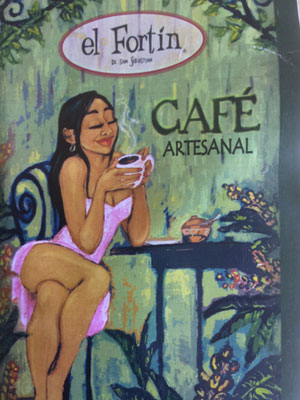
I’ve been reading Huruki Murikami. He’s a man who sells a lot of books. One of his short stories is The Elephant Vanishes. I thought maybe it would help with the mystery of all the elephant napkins. The story goes like this:
WHEN THE ELEPHANT disappeared from our town’s elephant house, I read about it in the newspaper. My alarm clock woke me that day, as always, at 6: 13. I went to the kitchen, made coffee and toast, turned on the radio, spread the paper out on the kitchen table, and proceeded to munch and read …
The adoption of a homeless elephant was a move that people could look upon favorably. People like old elephants better than sewers and fire engines. I myself was all in favor of having the town care for the elephant. True, I was getting sick of high-rise condos, but I liked the idea of my town’s owning an elephant …
On its right rear leg, the elephant wore a solid, heavy-looking steel cuff from which there stretched a thick chain perhaps thirty feet long, and this in turn was securely fastened to a concrete slab. Anyone could see what a sturdy anchor held the beast in place: The elephant could have struggled with all its might for a hundred years and never broken the thing …
[Then the elephant vanishes without a trace leaving the narrator listless.]
I felt like this a lot after my experience with the vanishing elephant. I would begin to think I wanted to do something, but then I would become incapable of distinguishing between the probable results of doing it and of not doing it. I often get the feeling that things around me have lost their proper balance, though it could be that my perceptions are playing tricks on me. Some kind of balance inside me has broken down since the elephant affair, and maybe that causes external phenomena to strike my eye in a strange way. It’s probably something in me …
The papers print almost nothing about the elephant anymore. People seem to have forgotten that their town once owned an elephant. The grass that took over the elephant enclosure has withered now, and the area has the feel of winter. The elephant and keeper have vanished completely. They will never be coming back …
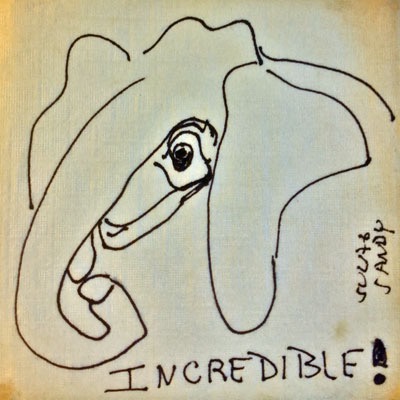
Sea Gull Cellar Bar Napkin Art, Sula and Sandy artists
It’s quite a thing for an elephant to disappear. I thought maybe the story would turn out to be a parody of Kafka’s A Hunger Artist. Murikami wins lots of writing prizes. He won the Franz Kafka prize in 2006. As it turns out, The Elephant Vanishes didn’t seem like a parody of Kafka. And, it wasn’t full of drama like George Orwell’s Shooting An Elephant. It was a mystery. There was something wrong. Elephants don’t just vanish.
The sun is up. I pour another cup of coffee. What is it I’m thinking about? I can’t remember. Boats arrive from the other side of the Bahia de Banderas. Fishermen line up along the shore. This second cup of coffee seems stronger … Oh yea, elephants, on napkins, vanished, shot, whatever.
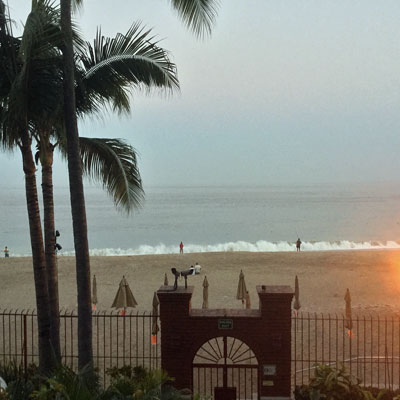
Murikami greatly admired Raymond Carver. Carver wrote “Elephant,” a short story about “dependency, security, struggle, acceptance and letting go” according to whoever wrote the Wikipedia page. A turning point in that story occurs when the narrator has a dream, a memory, of riding on his father’s shoulders pretending his father was an elephant. “You can let go, he said, I’ve got you. You won’t fall.” That sounds like a pretty ordinary father-son relationship, but the story had a lot more to it than that—the dependency, security, struggle, acceptance part.
Two cups is enough. Time to get ready for the morning walk. I’ll get back to the elephant stuff when I return, if I can remember. I like to walk in the morning. I always think of that little piece by David Wallace, This Is Water. When I walk, I like to make up stories about the other people. No time for elephants.
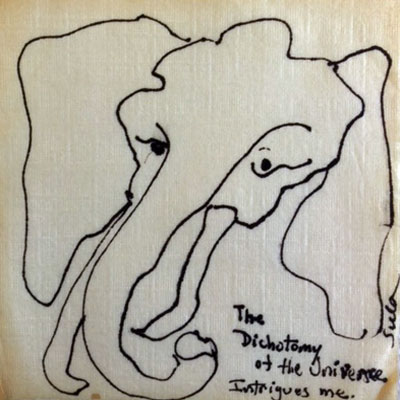
Sea Gull Cellar Bar Napkin Art, Sula artist
Murikami travelled to Port Angeles Washington to visit Carver. It was their only meeting. Murikami translated lots of Carver’s stories into Japanese.
Funny thing about memory. It came to me while having another cup of coffee after my walk. The words of the narrator in Carver’s story Elephant. I “pushed my cup back and forth in little circles on the table.” Yep, that’s what I remember of Carver’s story. The sun is up. People are already walking on the beach. The quiet time is gone.
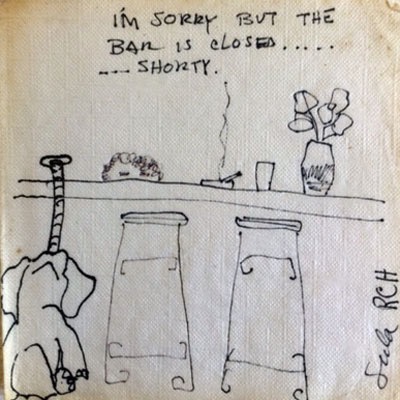
Sea Gull Cellar Bar Napkin Art, Sula and Roy Hoggard artists
Hemingway wrote a story about abortion, Hills Like White Elephants. Murikami liked this story.
Murakami is an international sensation, the author of two dozen books that are translated everywhere. “Men Without Women,” his new short-story collection, has Carver’s influence on every page. An actor knows his more-famous wife had affairs and after her death he befriends one of her lovers. A housewife delivers groceries to a shut-in and tells him stories after passionless sex. A doctor spends a lifetime keeping love at arm’s length and forgets its power. “Men Without Women” is the title of a 1927 short-story collection by Ernest Hemingway, but it’s Carver that Murakami is thinking of when he writes that “Dreams are the kind of things you can — when you need to — borrow and lend out.” Seattle Times
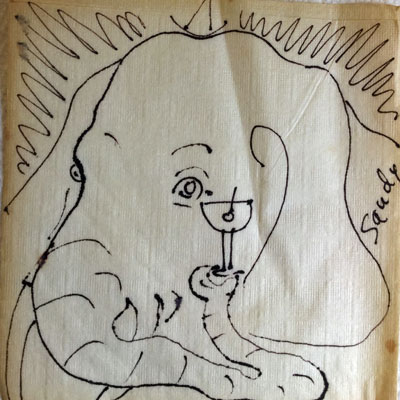
Sea Gull Cellar Bar Napkin Art, Sandy artist
Murikami didn’t meet Hemingway. Hemingway may or may not have met Orwell although he said he did later in life. Murikami, Carver, Orwell, Hemingway—they all wrote stories connected in some way to elephants. The world is full of connections. The Sea Gull elephant napkin art is probably connected somehow to all of this, but I’m not sure how. It has something to do with that memory of mine. If I could only get it clear.
Back in the bedroom, it’s still dark. The memory is still hanging in the air. It’s the elephant in the room.
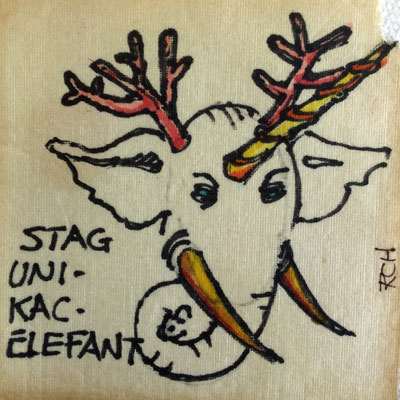
Sea Gull Cellar Bar Napkin Art, Roy Hoggard artist
**********
In the meantime … Mendocino Redwood Company in their History of the Land has some local lore about the elephant.
Strange as it may sound, those embarking for the California gold fields often announced that they were off “to see the elephant.” The phrase, in use even before the gold rush, captured the anticipation and circus-like atmosphere of the whole adventure. The story behind it varies a bit, but basically the tale is about a farmer and a circus wagon. A farmer heads to market with his wagon fully loaded.
Enroute he sees a circus parade, with an elephant at the front of the line. While the farmer was dazzled, his horses were terrified. Bolting, the horses overturn the wagon and the farmer’s produce spills across the road. Scarcely ruffled, the farmer says, “I don’t give a hang for I have seen the elephant.” (Levy xvi). Many a 49er must have returned from the California rivers and streams with empty pockets and a feeling that all they had seen was the elephant’s backside!
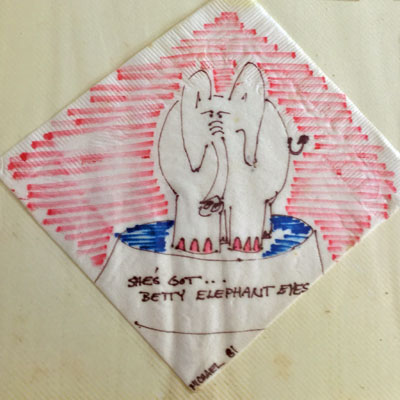
Sea Gull Cellar Bar Napkin Art, James Maxwell artist

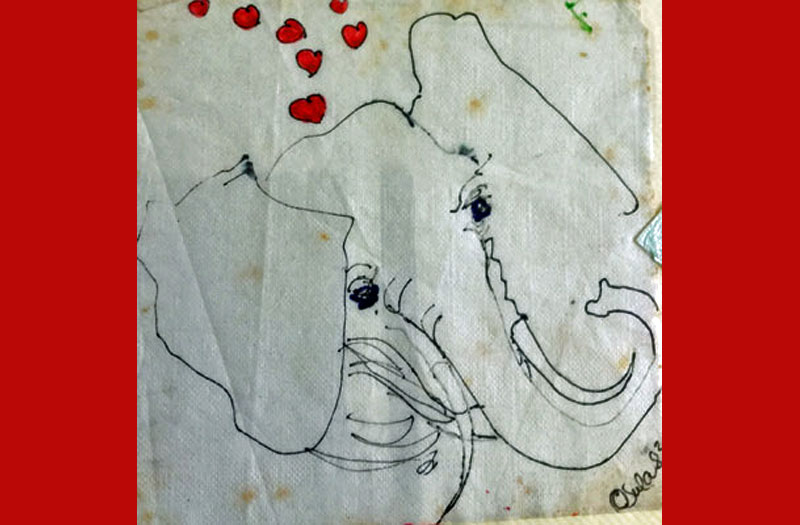
You are good.
I’d love to see a Round Table video-ed conversation between you and Roy and Maxwell and Sandra—talking napkin art, the core of their camaraderie, what’s up in all your lives now a’days; what you miss the most, best memories of the Golden Years at the SeaGull, what’s possible to re-construe and where a’bouts. Maybe a table of napkin artists that moves regularly from bar to bar down the coast.
We do have this https://thinkinthemorning.com/remembering-the-sea-gull-restaurant/
Maybe an update?
These are great! Who keeps bar napkin art??.
There are several independent collections. Some at Kelley House.
Wish I’d been here then. I know Laura Lengyel, an artist who was here then.
Who posted the professional-looking poster about the elephant lost in the vicinity of Mendosa’s that answers to the name of Maurice? Been a couple years.
I did not see that but presume it was a friend?